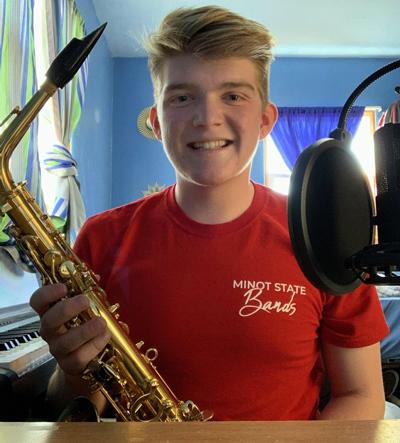Online music classes show Hunskor the importance of one-on-one

By Emily Schmidt
University Communications Student Assistant
studentpio@minotstateu.edu
MINOT, N.D. – The switch to online classes has instigated creativity and adaptation from all majors at Minot State, including normally hands-on degrees like music.
Freshman music education student Trent Hunskor is currently involved in nine music classes, each with their own adjustments.
Between two traditional music classes, an introduction to brass instruments class, three private lessons, and three music ensembles, Hunskor runs the gamut of the division of music’s transition online.
“It’s difficult to have a bit of a transition when you’re used to a routine, but it’s made us more well-rounded,” he said. “My classes’ set-ups are all over the spectrum. Everything’s different and we’re just adapting to it.”
In his music theory and aural skills classes, Hunskor has been attending video classes at 8 and 9 a.m., same as before, but the interaction with his professors and classmates is a little different.
"I enjoy seeing their faces a lot, and I like hearing their voices and talking with them. There’s still humor in class but it’s just not as personal,” he said. “Everyone’s muted, so you can see people laughing at a joke but can't hear it. We all miss each other, and you can tell. No one wants to hang up and we’re all just sitting there staring at each other.”
Concert band, jazz band, and choir have also changed modes, with assignments having transitioned to writing rather than playing in class and practicing.
“For jazz band, we listen to different pieces and talk about solos or the instrumentation and what our thoughts were,” Hunskor said. “It’s made me realize that there are more styles of jazz out there than what I’ve played before.”
Hunskor also worked with the other students in concert choir to create their own versions of the University’s alma mater.
Private lessons in saxophone, piano, and voice, have stayed fairly similar for Hunskor but with one significant difference: he does not play for his instructors live. Instead, he records his playing ahead of time, sends it to his instructors, and meets with them over video to discuss his improvements and the next week’s practice.
Recording music was an advancement across the entire division of music even before the online switch. Since the switch, however, the division has offered to refund each student $30 for any additional microphones they purchase for their classes.
Erik Anderson, division of music chair, is particularly interested in how this development will affect the division in the future.
“We bought a lot of technology, some of which was pre Covid-19, some of which was in response to it, that I think will fundamentally change the tech that is available to students and the comfort level that faculty and students have engaging in new ways of creating music,” Anderson said.
Hunskor agrees.
“We used technology quite a bit already for recording stuff, but I could see it being used more often now because most of the faculty and students are using it so much,” said Hunskor. “A lot of people have really good microphones now. I could see a lot more people using that for collaborative projects which would be interesting to see.”
Although collaborating online is an additional skill in his life, Hunskor still misses making music with his classmates in person.
“I’m looking forward to my first ensemble next year which will be marching band, seeing everybody’s face back in a marching band uniform, sweating it out on a football field all day and practicing the glide step.”
About Minot State University
Minot State University is a public university dedicated to excellence in education, scholarship, and community engagement achieved through
rigorous academic experiences, active learning environments, commitment to public service, and a vibrant campus life.
Published: 04/24/20




